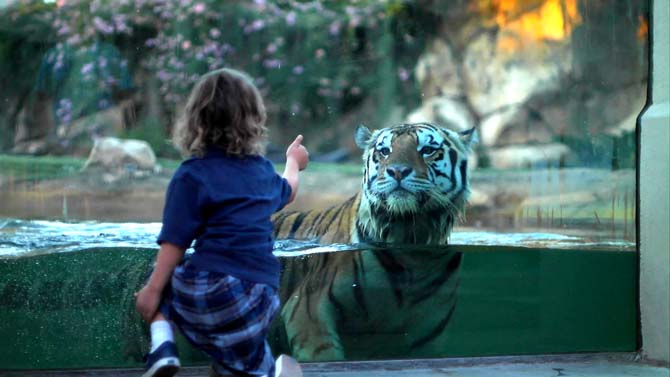Of all the classes I’ve taken at LSU, Buddhist Psychology is probably the most interesting. Over the course of this semester I’ve realized one aspect of the Buddhist mindset that could be readily adopted by a person of any religious or philosophical creed, and coincidentally, I see our furry mascot naturally apply a version of this in his everyday life — the art of appreciation.
The applicability of this trait lies in how one understands the present moment.
Take a look at Mike’s life. In the wild, he would be roaming a territory of 20 to 40 square miles.
In captivity, Mike has plenty of time to not mark a large territory, not ambush animals and not use November to seek out tigresses. He survives the tiny habitat he has paced over an infinite number of times, which promises him little variance in his day-to-day life.
Interestingly enough, Mike doesn’t appear to suffer from boredom.
In fact, he seems to appreciate what simple moments he does experience. The look on his face as he naps in the sunlight is of pure contentment. When it rains, he leaves his mouth open to take in the cool humidity, and proceeds to grapple with his purple ball in the pool. Often, he plays with people on the other side of his glass, despite his inability to make physical contact with them. Like any cat, he is curious about the minute oddities that occur in his area and becomes intense when investigating them.
Recognition of the occurrences in individual moments is a fundamental part of Buddhism. Because Buddhists view the universe as a continuous stream of processes, a veteran practitioner makes a mental note when they are in the process of walking, when they wash the dishes, when they drink tea, etc. The Buddhist takes a step back when they notice the feeling of jealousy or merriment arising and acknowledge the existence of the feeling.
I find the combination of these mentalities, where one recognizes the intricacies of moments and attributes pleasure to the recognition, quite eye-opening.
Such a moment occurs when you wake up to morning sunlight softly streaming through the window and take time to enjoy the subtle warmth of your sheets. It occurs when you strategically pour the perfect amount of dining hall waffle mix into a measuring cup. It occurs when you walk between classes, and the wind carries a sweet chill that invigorates your body and mind.
It is possible for people to feel this alive every day, and the world would be better off for it. Rather than the tragedies of life forcing a person into their own cage, one could still appreciate a lungful of air. Instead of focusing solely on gaining for one’s own sake, one can work with others to help benefit many, and thereby indirectly oneself.
Appreciation is a powerful player in this world. Citizens of Denmark, the happiest nation in the world according to the 2013 World Happiness Report, are ranked at the top because of how grateful they are of what little they have. Foreign enemies have taken so much from the country in the past few centuries that citizens value the financial security they receive from their government, which is paid for by their high tax rates.
The U.S. barely competes with its rating of 17.
I see great potential for making this rank rise. While there will always be aspects of our communities and government systems to gripe about, we have a great amount of liberty when it comes to deciding our life paths — this is both the price and reward of living in a democratic republic. The recognition and valuing of even the seconds in our life can only do good for this country, and I’d like to see my peers follow Mike’s suit to live fuller, happier lives.
Alix Landriault is a 21-year-old mass communication junior from Natchitoches, La.
Opinion: Students should follow Mike’s grateful, Buddhist mindset
November 11, 2013
A child interacts with Mike the Tiger at his habitat Thursday evening.





